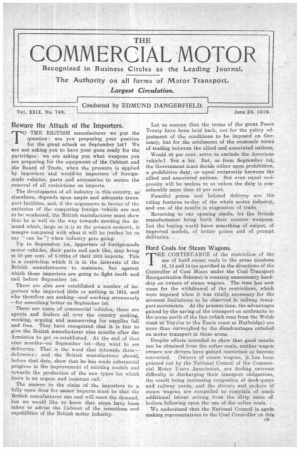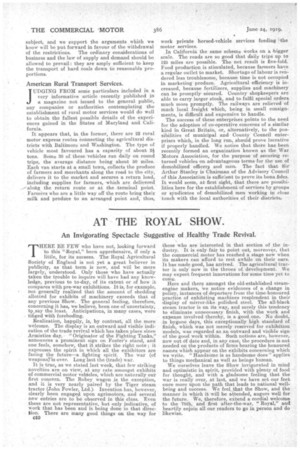Beware the Attack of the Importers.
Page 1

Page 2

If you've noticed an error in this article please click here to report it so we can fix it.
0 THE BRITISH manufacturer we put the question: are you preparing your position for the great attack on September 1st? We are not asking you to have your guns ready for the partridges: we are asking you what weapons you are preparing for the equipment of the Cabinet and the Board of Trade, when the pressure is applied by importers and would-be importers of foreignmade vehicles, parts and accessories to secure the removal of all restrictions on imports.
The development of all industry in this country, as elsewhere, depends upon ample and adequate transport facilities, and, if the arguments in favour of the exclusion of the competing foreign vehicle are not to be weakened, the British manufacturer must show that he is well on the way towards meeting the demand which, large as it is at the present moment, is meagre compared with what it will be (rather let us say "can be ") when industry gets going.
Up to September 1st, importers of foreign-made motor vehicles, their parts and such like, may bring in 50 per cent. of 5-12ths of their 1913 imports. This is. a restriction which it is in the interests of the British manufacturers to maintain, but against which those importers are going to fight tooth and nail before September 1st.
There are also now established a number of imyorters who imported little or nothing in 1913, and who therefore are seeking—and working strenuously —for something better on September 1st, There are users of commercial vehicles, there are agents and dealers all over the country seeking, working, arguing and manoeuvring for supplies full and free. They have recognized that it is fair to give the British manufacturer nine months after the Armistice to get re-established. At the end of that nine months—on September lst—they want to see deliveries. That is the word that interests them— deliveries ; and the British manufacturer should, before that date, show that he has made substantial progress in the improvement of existing models and towards the production of the new types for which there is an urgent and insistent call..
The answer to the claim of the .importers to a fully open door for inotorImports must be that the British manufacturer can and will meet the demand, but we would like to know that steps have been taken to advise the Cabinet of the intentions a.nd capabilities of the British motor industry. Let us assume that the terms of the great Peace Treaty have been held back, not for the paltry adjustment of the conditions to be imposed on Germany, but for the settlement of the economic terms of trading between the allied and associated nations.
Would 45 per cent. serve to exclude the American vehicle? Not a bit. But, as from September 1st, the Government must decide either upon prohibition, a prohibitive duty, or equal reciprocity between the allied and associated nations. But even equal reciprocity will be useless to us unless the duty is considerably more than 45 per cent.
Fanciful prices and belated delivery are the ruling features to-day of the whole motor industry., and one of the results is stagnation of trade.
Returning to our opening simile, let the British manufacturers bring forth their counter weapons. Let the buying world know something of output, of improved models, of better prices and of prompt deliveries.
Hard Coals for Steam Wagons. THE CONTINUANCE of the restriction of the use of hard steam coals to the areas numbers 12, 13 and 14 (as specified in the directions of the Controller of Coal Mines under the Coal Transport Reorganization Scheme) is creating unnecessary hardship on owners of steam wagons. The time has now come for the withdrawal of the restrictions, which were imposed when it was vitally necessary for the severest limitations to be observed in railway transport movements. At the present time, the advantages gained by the saving of the transport on anthracite to the areas north of the line (which runs from the Welsh coast at Ynyslas to the Essex coast at Heybridge) are more than outweighed by the disadvantages entailed on motor transport in those areas.
Despite efforts intended to show that good results can be obtained from the softer coals, neither wagon owners nor drivers have gained conviction or become. converted. Owners of steam wagons, it has been pointed out by the National Council of the Commercial Motor Users Association, are finding extreme difficulty in discharging their transport obligations, the result being increasing congestion of dock-quays and railway yards, and the drivers and stokers of steam wagons are compelled to complain of much additional labour arising from the dirty state of boilers following upon the use of the softer coals.
We understand that the National Council is again making representations to the Coal Controller on this subject, and we support the arguments whih we know will be put forward in favour of the withdrawal of the restrictions. The ordinary considerations of business and the law of supply and demand should be allowed to prevail: they are amply sufficient to keep the transport of hard coals down to reasonable proportions.
American Rural Transport Services.
JUDGING FROM some particulars included in a very informative article -recently published in a magazine not issued to the general public, any companies or authorities contemplating the establishment of rural motor services would do well to obtain the fullest possible details of the experiences gained in the States of Maryland and California.
It appears that, in the former, there are 22 rural motor express routes -Connecting the agricultural districts with Baltimore and Washington. The type of vehicle most favoured has a capacity of about 2i tons. Some 30 of these vehicles run daily on round trips, the average distance being about 50 miles. Each van starts at a small town, collects the produce of farmers and merchants along the road to the city, delivers it to the market and secures a return load, including supplies for farmers, -which are delivered -s along the return route or at the terminal point. Farmers who are a little way off the route bring their milk and produce to an arranged point and, thus,
work private horsed-vehicle services feeding the motor services.
In California the same scheme works on it bigger scale. The roads are so good that daily trips up to 125 miles are possible. The net result is five-fold. Food production is stimulated, because farmers have a regular outlet to market. Shortage of labour is rendered less troublesome, because time is not occupied in marketing produce. Agricultural efficiency is increased, because fertilizers, supplies and machinery can be promptly secured. Country shopkeepers are able to carry larger stock, and to fulfil special orders much more promptly. The railways are relieved of much local freight which, being in small consignments, is difficult and expensive to handle. The success of these enterprises points to the need for the adoption of co-operative concerns of a similar kind in Great Britain, or, alternatively, to the possibilities of municipal and County Council enterprises which, in the long run, should prove lucrative if properly handled. We notice that there has been recently formed an organization known as the War Motors Association, for the purpose of securing returned vehicles on advantageous terms for the use of demobilized officers and men. The fact that Sir Arthur Stanley is Chairman of the Advisory Council of this Association is sufficient to prove its bona,fides. It would seem, at first sight, that there are possibilities here for the establishment of services by groups or syndicates of demobilized men working in close touch with the local authorities of their districts.










































